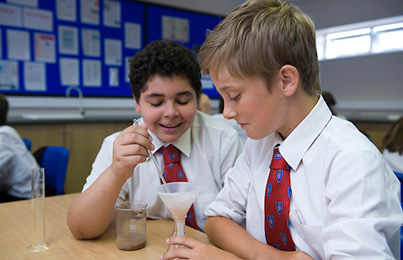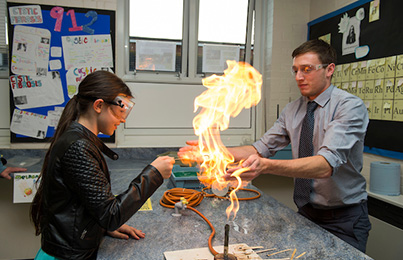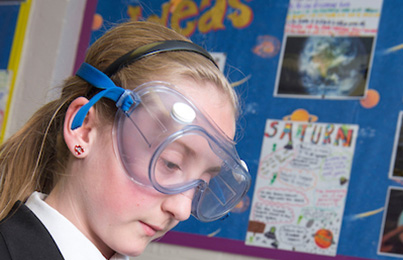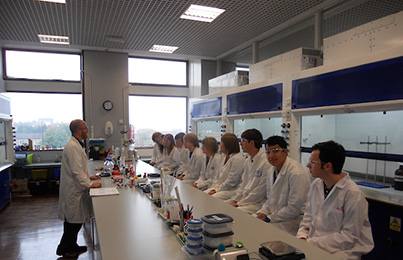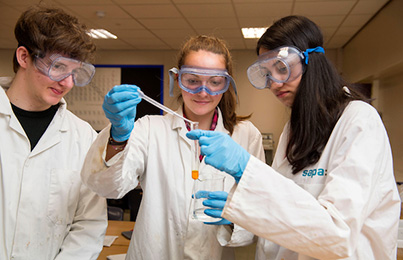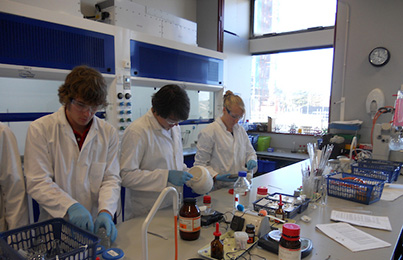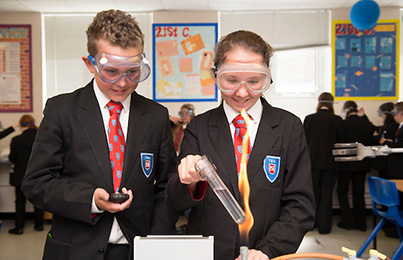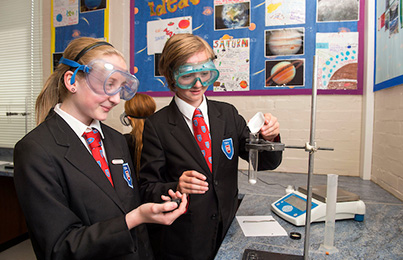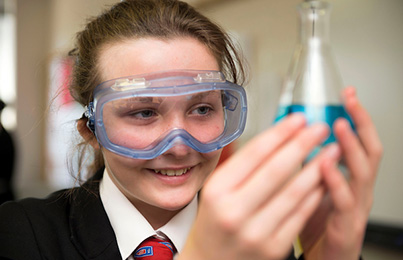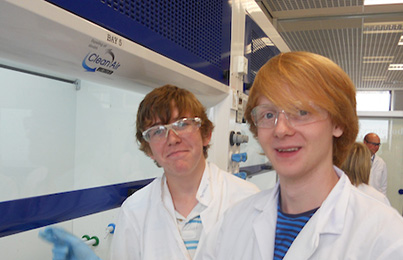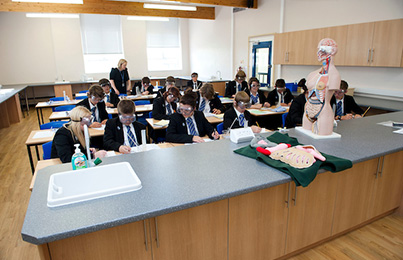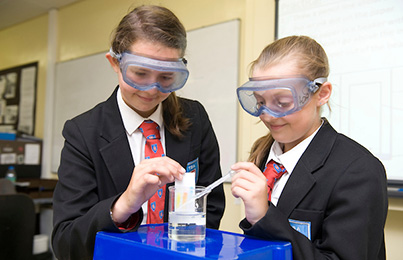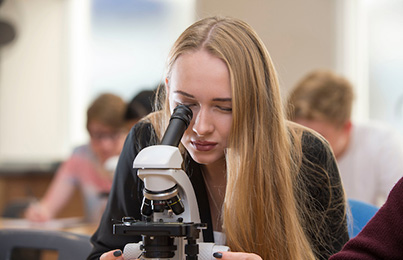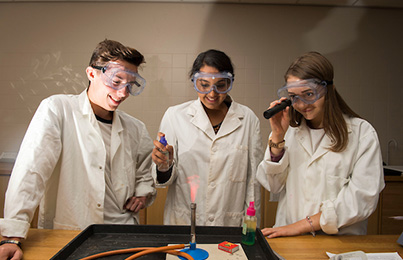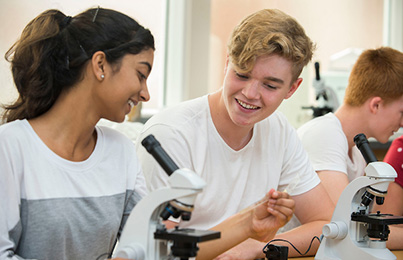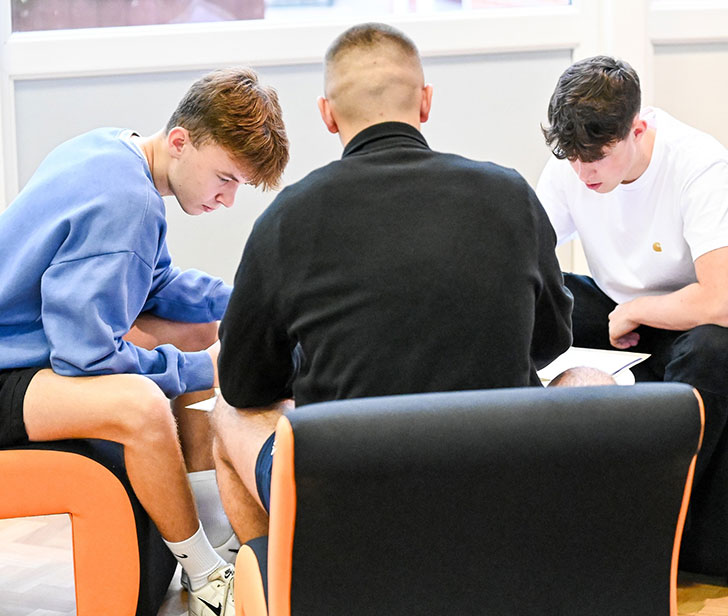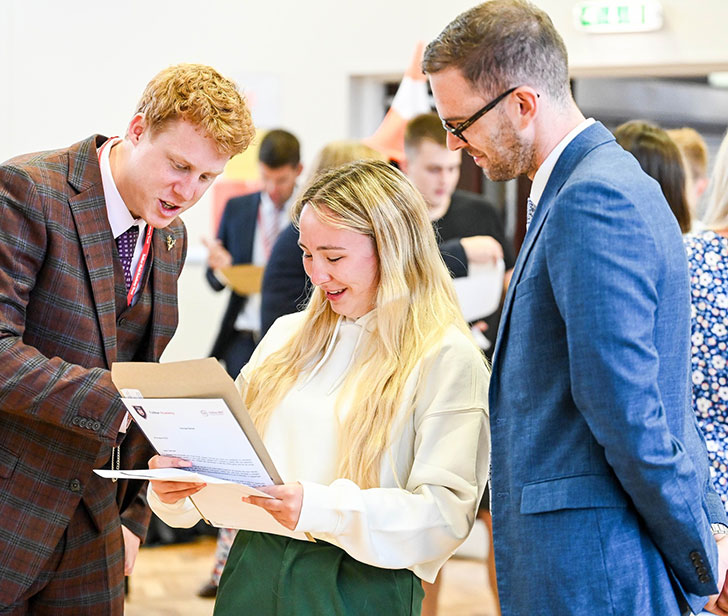Science
Curriculum Intent, Implementation & Impact
- Science
- Ethos & Values
- Knowledge & Skills
- Resources & Facilities
- Courses & Qualifications
- GCSE Combined & Separate Science
- Learning Outside The Classroom
- Where Does This Take Me In The Future?
Science
Science is a key subject in the Academy. It develops thinking skills as well as a practical approach to problem solving. These skills are essential both in the workplace and for personal decision-making. Students develop skills across the key stages and are able to think independently, reason, solve problems and assess risk.
Please explore these pages to find out more about what we offer.
Ethos & Values
As a Curriculum Area, our primary teaching aims are:
- To produce not only well-qualified scientists, but also young people who can use their knowledge, understanding, application and skills throughout adult life;
- To enable students to experience an exciting and creative climate for learning Science, regardless of key stage and ability;
- To maintain the Science Curriculum Area at the leading edge of educational innovation;
- To raise the overall standard of teaching and learning in Science;
- To maintain a philosophy of continuous improvement in every aspect of the Science Curriculum Area;
- To support Academy and national strategies in literacy, numeracy and the use of ICT within the context of Science.
Knowledge & Skills
The aims of these qualifications are to encourage students to:
- Acquire a systematic body of scientific knowledge, and the skills needed to apply this in new and changing situations in a range of domestic, industrial and environmental contexts;
- Acquire an understanding of scientific ideas, how they develop, the factors which may affect their development and their power and limitations;
- Plan and carry out investigative tasks, considering and evaluating critically their own data and that obtained from other sources, and using ICT where appropriate;
- Use a multitude of resources such as: scientific journals, scientific literature, computer simulations, the internet and/or more traditional sources of information such as scientific books to research and plan an investigation;
- Select, organise and present information clearly and logically, using appropriate scientific terms and conventions, and using ICT where appropriate;
- Interpret and evaluate scientific data.
The Twenty First Century Science suite studied at Waltham Toll Bar Academy comprises three subjects which share common material, use a similar style of examination questions and have a common approach to skills assessment.
GCSE Biology covers the major animal and plant systems in a traditional way, but also introduces the students to important breakthroughs of recent years, such as cloning and genetic engineering. Topics include: food and ecosystems, life on Earth, the human body, using food and controlling growth and genes.
GCSE Chemistry aims to give students a sound knowledge base, as well as industrial and practical applications of chemistry. Topics include: air and water, chemical patterns, chemicals of the natural environment, material choices, chemical analysis and making useful chemicals.
GCSE Physics provides students with a thorough knowledge of the subject, and develops their understanding through the use of examples taken from a modern everyday context. Topics include: forces and motion, electricity and electrostatics, the electromagnetic spectrum, light and sound, and radioactivity.
GCSE Combined Science combines Biology, Chemistry and Physics and emphasises scientific literacy - the knowledge and understanding which students need to engage as informed citizens with science-based issues. It features many of the major scientific theories in a way that encourages students to appreciate their importance in everyday life. The course also explores how scientific information is obtained, how reliable it is, what its limitations are, and how this information helps society to make important decisions.
The new GCSE also develops students' ability to plan and carry out scientific investigations and their understanding of the role of experimental work in developing scientific explanations.
Resources & Facilities
The Science Curriculum Area is large, comprising 17 general teaching laboratories and 1 computer suite all of which have interactive white boards or projectors (2) and access to a comprehensive suite of software. In addition there are three very well-resourced preparation areas and a staff work-area.
Very well resourced throughout, the Science Curriculum Area provides opportunities for whole-class practical work at all ages and levels. New text books, software and worksheets have been purchased to meet the needs of all of our students. Recently the data logging equipment and software has been added to so the students have the opportunity of using state of the art technology.
Courses & Qualifications
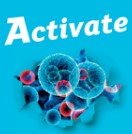
Key Stage 3:
Students follow the National Curriculum in Science. The course is taught over 2 years using the 'Activate' Scheme of Work. Students have 3 Science lessons each week.
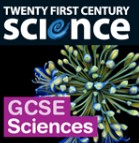
Key Stage 4:
(GCSE in 21st Century Science OCR)
Combined Science:
The course is taught over 3 years with 6 lessons per week covering Biology, Chemistry and Physics content. There are four examinations for GCSE Combined Science. Three of these are for the subjects (Biology, Chemistry and Physics). The fourth exam paper assesses Data Analysis skills.
Separate Science:
The course is taught over 3 years with 3 lessons per week on each science, Biology, Chemistry and Physics or Computer Science. There are two examinations for each GCSE Science (Biology, Chemistry, and Physics) each worth 50% of the final grade. Each paper will cover all of the topics from the separate sciences.
GCSE Combined Science & Separate Science
Science is a core subject in the National Curriculum and, as such, must be studied by all to the age of 16. A broad and balanced GCSE Science curriculum can be followed at Waltham Toll Bar Academy in Years 9, 10 and 11, using the OCR Twenty First Century Science specification. The Science Faculty comprises a full complement of specialist science teachers experienced in the teaching of Science GCSE courses.
All of us, as citizens, need to be able to cope with the science that shapes our lives. We are on the receiving end of scientific ideas and technical information in many different roles such as worker, householder, parent, patient, voter or juror.
Some young people aspire to be scientists, or to work in careers where knowledge of this subject is essential; educating the next generations of science practitioners is crucial.
How many GCSE grades will students get?
A student taking Combined GCSE Science will be awarded two GCSE Science levels. A student taking separate GCSE Science will be awarded a GCSE level for each science taken - 3 in total. Because the assessment of the courses are independent, these grades may be different.
Practical Skills
Throughout the year students will complete a broad variety of investigations. Students will be able to enhance their ability to plan and carry out practical investigations and their understanding of the role of experimental work. They will also be provided the opportunity to develop their data analysis skills.
Examinations
| GCSE Science Combined | 4 exams: Biology worth 26.4% Chemistry worth 26.4% Biology worth 26.4% Combined Science 20.8% |
|---|---|
| GCSE Biology | 2 exams: Breadth in Biology worth 50% Depth in Biology worth 50% |
| GCSE Chemistry | 2 exams: Breadth in Chemistry worth 50% Depth in Chemistry worth 50% |
| GCSE Physics | 2 exams: Breadth in Physics worth 50% Depth in Physics worth 50% |
Learning Outside The Classroom
Science Club
Science Club runs for all Year KS3 students. Activities are undertaken each week by the students which aim to improve their problem-solving skills and application of scientific method.
The aims of Science Club are:
- To enrich, enhance and extend the Key Stage 3 curriculum;
- Improve attainment in, interactions with, and experiences of, science among those students already showing interest and ability in science;
- Encourage students to continue their education in STEM beyond GCSE level.
Stem Club
Stem Club is aimed at our KS4 students. This combines Science, Technology, Engineering and Mathematics. Projects and activities conducted usually involve modern technology to accentuate the practical applications of science in the near future. Students get to apply the various domains of STEM in a context that helps them realize a connection between the classroom and the world around them.
Catch Up
During the year students are invited to attend catch-up sessions whenever necessary as well as for students to build on and improve their classwork. Students can come in and do their work in a relaxed atmosphere with more one to one help from the staff.
Revision Sessions
Revision sessions are run for KS4 throughout the year with a particular focus at Year 11; these sessions take place after Academy hours, at weekends and during half-term. These sessions cover all GCSE content and allow students the opportunity to develop and strengthen their scientific knowledge and understanding of content in preparation for GCSE examinations.
Where Does This Take Me In The Future?
GCSE
- Provides opportunities for students who may wish to be employed in the Science industry or organisations that use science, to develop knowledge and skills in specific sciences;
- Provides a good progression route to more advanced qualifications.
